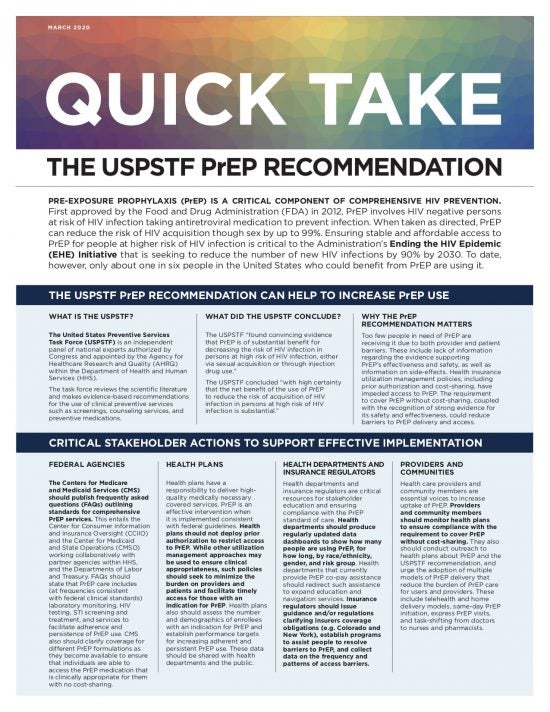 Today, the O’Neill Institute released a new publication, Quick Take: The USPSTF PrEP Recommendation. The Quick Take discusses the final recommendation for pre-exposure prophylaxis (PrEP) from the United States Preventive Services Task Force (USPSTF) and why the PrEP recommendation matters. It was written by me and Jeffrey S. Crowley, Program Director of the O’Neill Institute’s Infectious Diseases Initiative.
Today, the O’Neill Institute released a new publication, Quick Take: The USPSTF PrEP Recommendation. The Quick Take discusses the final recommendation for pre-exposure prophylaxis (PrEP) from the United States Preventive Services Task Force (USPSTF) and why the PrEP recommendation matters. It was written by me and Jeffrey S. Crowley, Program Director of the O’Neill Institute’s Infectious Diseases Initiative.
The USPSTF is a federally-appointed independent panel of physicians and other experts that reviews the scientific literature and makes evidence-based recommendations for the use of clinical preventive services such as screenings, counseling services, and preventive medications. In June 2019, after a review of the scientific evidence, the USPSTF issued a final “Grade A” recommendation for PrEP. The USPSTF “found convincing evidence that PrEP is of substantial benefit for decreasing the risk of HIV infection in persons at high risk of HIV infection, either via sexual acquisition or through injection drug use”, and it concluded “with high certainty that the net benefit of the use of PrEP to reduce the risk of acquisition of HIV infection in persons at high risk of HIV infection is substantial.”
The USPSTF PrEP recommendation has the potential to increase access to PrEP for HIV prevention and signals to health care providers the importance of offering PrEP to patients. The recommendation means that most private health plans and all Medicaid-expansion programs must cover PrEP without cost-sharing. This requirement to cover PrEP with no cost-sharing goes into effect when a health plan’s next plan year begins on or after June 11, 2020. For most individual marketplace health plans and many group health plans, which have January 1st plan years, the requirement would be effective in January 2021. However, states may require coverage of PrEP with no cost-sharing before this time. In New York State, the Department of Financial Services issued guidance requiring insurers to cover PrEP without cost-sharing no later than January 1, 2020.
It is not clear what the USPSTF PrEP recommendation will mean for coverage of components of PrEP care beyond the medication itself. PrEP involves more than taking medication. Essential components of PrEP care include regular provider visits, laboratory monitoring, HIV testing, STI screening and treatment, and services to facilitate adherence and persistence of PrEP use. Additional guidance is needed to ensure access to all components of PrEP care without cost-sharing. Federal regulators should also clarify coverage for different PrEP regimens, such as long-acting PrEP formulations that are in development, to ensure that individuals are able to access these regimens with no cost-sharing as they become available.
A number of different stakeholders are working to increase access and reduce disparities in access to PrEP, and the USPSTF PrEP recommendation is important to these efforts. The Quick Take outlines critical actions that are needed from federal agencies, health plans, state health departments and insurance regulators, and providers and communities to support effective implementation of the USPSTF PrEP recommendation. The time to act is now.



